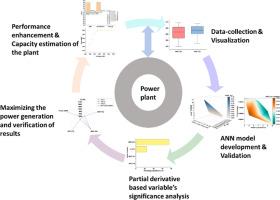The true potential of artificial intelligence (AI) is to contribute towards the performance enhancement and informed decision making for the operation of the large industrial complexes like coal power plants. In this paper, AI based modelling and optimization framework is developed and deployed for the smart and efficient operation of a 660 MW supercritical coal power plant. The industrial data under various power generation capacity of the plant is collected, visualized, processed and subsequently, utilized to train artificial neural network (ANN) model for predicting the power generation. The ANN model presents good predictability and generalization performance in external validation test with R2 = 0.99 and RMSE =2.69 MW. The partial derivative of the ANN model is taken with respect to the input variable to evaluate the variable’ sensitivity on the power generation. It is found that main steam flow rate is the most significant variable having percentage significance value of 75.3 %. Nonlinear programming (NLP) technique is applied to maximize the power generation. The NLP-simulated optimized values of the input variables are verified on the power generation operation. The plant-level performance indicators are improved under optimum operating mode of power generation: savings in fuel consumption (3 t/h), improvement in thermal efficiency (1.3 %) and reduction in emissions discharge (50.5 kt/y). It is also investigated that maximum power production capacity of the plant is reduced from 660 MW to 635 MW when the emissions discharge limit is changed from 510 t/h to 470 t/h. It is concluded that the improved plant-level performance indicators and informed decision making present the potential of AI based modelling and optimization analysis to reliably contribute to net-zero goal from the coal power plant.


